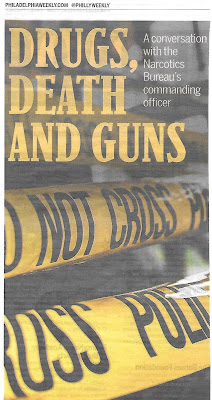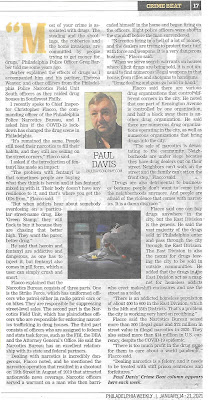I recently drove past Kensington and once again saw the sad zombie-like drug addicts stumbling about or squatting on the litter-filled sidewalk.
Philadelphia, like other cities around the country, has a serious drug problem.
I recall interviewing Philadelphia Police Chief Inspector Christopher Flacco about the drug problem for my Philadelphia Weekly Crime Beat column back in 2021.
You can read the column below or the below text:
Barber explained the effects of drugs as I accompanied him and his partner, Theresa Weaver, and other officers from the Philadelphia Police Narcotics Field Unit South officers as they raided drug houses in Southwest Philly.
I recently spoke
to Chief Inspector Christopher Flacco, the commanding officer of the
Philadelphia Police Narcotics Bureau, and I asked him if the COVID-19 lockdown
has changed the drug scene in Philadelphia.
“It’s remained the
same. People still need their narcotics to fill their habits, and they still
are selling on the street corners,” Flacco said.
I asked if the
introduction of fentanyl has made an impact.
“The problem with
fentanyl is that sometimes people are buying what they think is heroin and it
has fentanyl mixed in with it. Their body doesn’t have any resilience to it,
and that’s where you get the ODs from,” Flacco said.
“But when addicts
hear about somebody overdosing on a particular street-name drug, like ‘Green
Stamp,’ they will flock to buy it because they are chasing that better high.
They want the purer, better drug.”
He said that heroin and fentanyl are addictive and dangerous, as one has to inject it, but fentanyl also comes in pill form, which a user can simply crush and snort.
Flacco explained that the Narcotics Bureau consists of three parts. One is the Strike Force, which has uniformed officers who patrol either in radio patrol cars or on bikes. They are responsible for suppressing street-level sales. The second part is the Narcotics Field Unit, which has plainclothes officers who are responsible for enforcing narcotics trafficking in drug houses. The third part consists of officers who are assigned to federal and state task forces, such as the FBI, the DEA and the Attorney General’s Office. He said the Narcotics Bureau has an excellent relationship with its state and federal partners.
Dealing with
narcotics is incredibly dangerous, Flacco noted, and he mentioned the narcotics
operation that resulted in a shootout on 15th Street in August of 2019 that attracted
nationwide news coverage. Narcotic officers served a warrant on a man who then
barricaded himself in the home and began firing on the officers. Eight police
officers were shot in the standoff before the man surrendered.
“Narcotics bring
in a hell of a lot of money, and the dealers are trying to protect their turf
with force and weapons. It is a very dangerous business,” Flacco said.
“When we serve
search warrants on houses where illicit drugs are being sold, it is not unusual
to find numerous illegal weapons in that house, from rifles and shotguns to
handguns.
“Drug dealing and
guns go hand-in-hand.”
Flacco said there
are various drug organizations that control different corners in the city. He
noted that one part of Kensington Avenue is controlled by one organization, and
half a block away there is another drug organization. He said there are
numerous drug organizations operating in the city, as well as numerous
organizations that bring drugs into the city.
“The sale of narcotics
is devastating to the community. Neighborhoods are under siege because they
have drug dealers out on their street. Neighbors can’t walk on the street and
the family can’t sit on the front step,” Flacco said.
“Drugs are also
detrimental to businesses because people don’t want to come into the
neighborhoods anymore. And people are afraid of the violence that comes with
narcotics. It is a damn disgrace.”
“Narcotics
bring in a hell of a lot of money, and the dealers are trying to protect their
turf with force and weapons. It is a very dangerous business.”
Flacco said one can buy drugs anywhere in the city, but the East
Division is the genesis. He said the vast majority of the drugs sold in
Philadelphia enter and pass through the city through the East Division. The
East Division is also the nexus for drugs leaving the city to be sold in
outside communities. He added that the drugs in the East Division act as a
magnet for homeless addicts who erect makeshift enclosures and use the street
as a toilet.
“There is an
addicted homeless population of about 400 to 600 in the East Division, which is
the 24th and 25th Districts. That’s a problem the city is
working very hard on rectifying.”
Flacco said the
Narcotics Bureau seized more than 500 illegal guns and $72 million in street
value in illegal narcotics in 2020. They also seized more than $14 million in
U.S. currency, despite the COVID-19 epidemic.
“There is too much
profit in the drug game for them to care about a world pandemic,” Flacco
said.
“Dealing narcotics
is a felony, and it needs to be treated with stiff prison sentences and
forfeitures.”
Paul Davis’ Crime Beat column appears here each week.




No comments:
Post a Comment